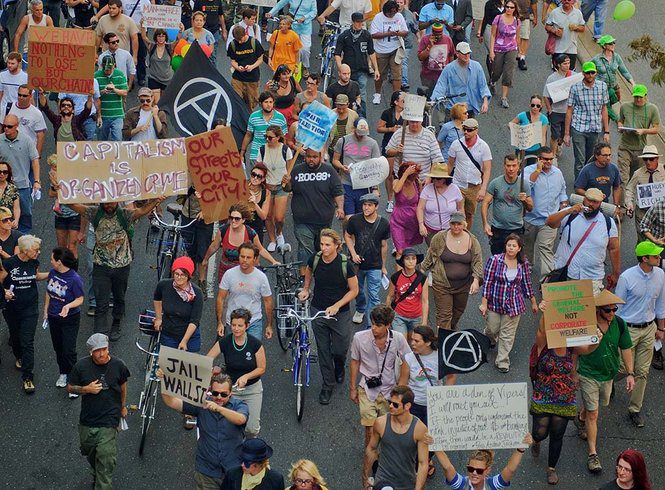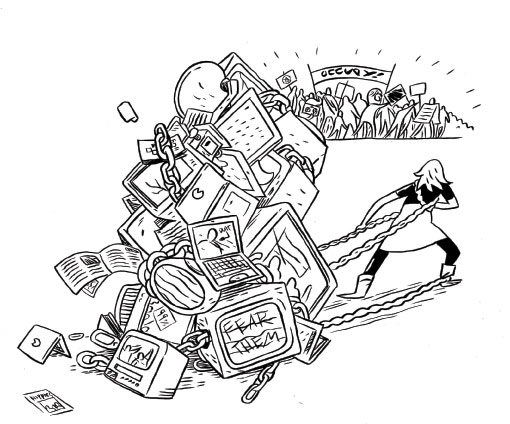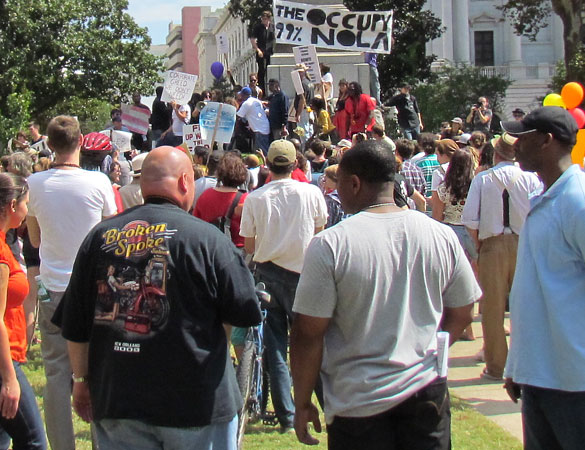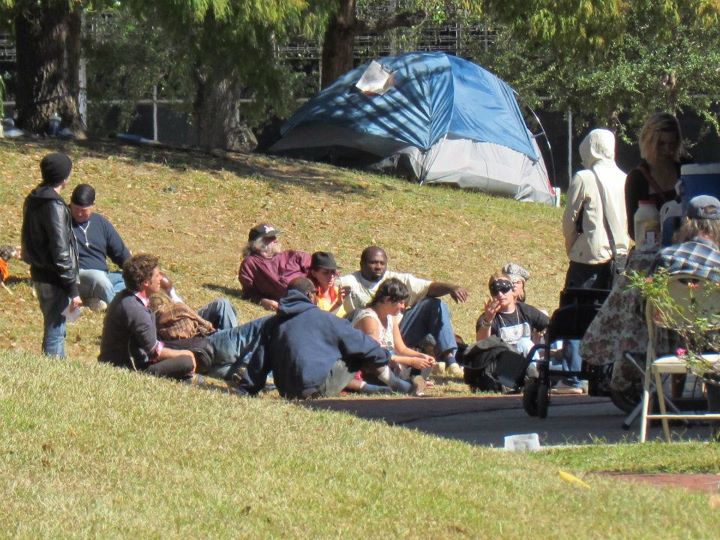by John Clark
 Just over a week after Occupy New Orleans was founded, a message appeared on the local discussion list stating that “the whole movement is stagnant,” that there is “no passion, just process,” and that “it is losing ground fast.” Someone accused the writer of being an agent provocateur. However, similar views were expressed by other members within the Movement; it did not have to be introduced from outside.
Just over a week after Occupy New Orleans was founded, a message appeared on the local discussion list stating that “the whole movement is stagnant,” that there is “no passion, just process,” and that “it is losing ground fast.” Someone accused the writer of being an agent provocateur. However, similar views were expressed by other members within the Movement; it did not have to be introduced from outside.
Disruptive agents are always lurking around, but they are far from the greatest threat to our Movement. We suffer from certain tendencies that are widespread throughout contemporary culture, and that disrupt our work much more effectively than can any paid forces of disorder. Fortunately, we have a great deal of control over whether we lapse into dissention and disillusionment, or whether we become the vital, growing community of liberation and solidarity that we are capable of being.
I recently heard an interview with a Libyan activist who talked of the death of his father, who was a martyr for democracy over twenty years ago. He said that many times he wondered, as he saw little progress over those many years, if his father’s life had been thrown away. But he always kept faith. Then, decades later, he saw masses of people revolting in the name of democracy, and his father’s own words were quoted in mass demonstrations, as the dictatorship crumbled. Fortunately, he had not dismissed the value of his father’s sacrifice after a week or two.
We should think about what it means, on the deepest level, to be part of a movement. It has nothing to do with immediate gratification and egoistic satisfaction, which are the superficial and false promises of our sick consumer society. Fundamental social transformation and authentic liberation demand patience, dedication, compassion, and solidarity. The rewards are deep, not superficial. Some are long-term, but others come relatively quickly, if not instantaneously. The greatest of these is to be part of a community of solidarity and liberation, what Martin Luther King called “The Beloved Community,” in the process of its own self-creation. Freud may have been off on many points, but one of his most incisive insights was the idea that what ultimately makes our lives worthwhile is the presence of love and good work. The Beloved Community is a community of people doing good work in the name of, and through the practice of, love and solidarity.
If this is true, then many of the most important goals of the Occupation Movement do not have to wait for the overthrow of the global economic order and the establishment of that “other world” that is possible in the future. It was once said of the early struggles of the working class that “the real fruit of their battles lies, not in the immediate result, but in the ever expanding union of the workers.” We might say that the real fruit of our struggle lies in both the immediate and long-term results, that is, in the ever-expanding self-realization of the free community. Our means are one with our ends.
Sometimes, we get trapped in a world of false immediacy. Sometimes we put our own “pre-occupations” above the community’s occupation. We need to strive against obsession with winning non-essential votes or getting our way in the short run, when the basic character and values of the Movement are not at stake. We need to take satisfaction in the immediate good that we are achieving. We need to be able at times to disagree strongly with the majority and then take great satisfaction that in “standing aside” and refusing to block consensus, we are contributing to the needs of the community. We need at times to be able to experience the joy of sacrifice. When we achieve a consensus on some flawed, imperfect proposal that realizes some, but far from all of our hopes, this immediately fulfills what is perhaps our most important aspiration. It realizes our hope that we (flawed, imperfect beings) can practice direct democracy, and build a cooperative community. We can do something extraordinary.
 Everything we do in our meetings and organizing needs to be evaluated in the light of what it contributes to the self-realization of our community. To the extent that our Movement embodies, here and now, the community of liberation and solidarity, we will win over more and more others to our cause. In everything we do– in our participation in general assemblies, in our work in committees, in our messages to lists, and in our informal contacts– we need to ask if our mode of interaction will make others want to be part of our community. This seems obvious, yet we must remind ourselves of it constantly, since the obvious is often forgotten in the heat of controversy, or lost in the minutiae of issues. If we practice love, solidarity and respect for one another, those who come in contact with us will want to join us.
Everything we do in our meetings and organizing needs to be evaluated in the light of what it contributes to the self-realization of our community. To the extent that our Movement embodies, here and now, the community of liberation and solidarity, we will win over more and more others to our cause. In everything we do– in our participation in general assemblies, in our work in committees, in our messages to lists, and in our informal contacts– we need to ask if our mode of interaction will make others want to be part of our community. This seems obvious, yet we must remind ourselves of it constantly, since the obvious is often forgotten in the heat of controversy, or lost in the minutiae of issues. If we practice love, solidarity and respect for one another, those who come in contact with us will want to join us.
When a transformative movement is in the news and is growing, curious people often wander into meetings and events, or check out discussion lists and newsletters, mainly to see what the commotion is about. They will come under the spell of the transformative community, if it consistently expresses its ideals of justice, love, and solidarity. This is what the great communitarian anarchist thinkers taught. As Elisée Reclus said, “it is step by step, through small, loving, and intelligent associations, that the great collegial society will be formed.” Gustav Landauer predicted that when free, cooperative communities begin to spread across the land, many will observe “their joy in life, in its inexpressible though quiet manner,” and yearn to be part of such a community.
Such experience was part of my own personal transformation. When I was in my late teens, a friend and I went to a civil rights meeting at Xavier University. Neither of us was sympathetic to the cause, but we wanted to see what was going on. We had been indoctrinated with conservative and racist ideas, and reactionary conditioning still had a great influence on us. However, we were curious, and, for some strange reason, open-minded. So we checked out the meeting. It turned out that we were both deeply impressed by the extraordinary spirit of the group, by the humanity, sensitivity, dedication, and enthusiasm of its members. The event was a turning point and had a lasting effect on both of us.
In large part as the result of this experience, my friend decided to join an interracial exchange program. In the program, black youth from northern cities spent time with white families in the South, and white youth from the South stayed with black families in northern cities. He lived with a black family in Detroit and had a teenager from the family as his roommate. This more or less completed the conversion process that had started at the meeting at Xavier.
The experience also contributed to my own transformation. I was impressed not only by the good points the members of the group made, but above all by what good people they were and how well they interacted with one another. They were joyful and hopeful, and cooperative and respectful to one another, in addition to being dedicated to the cause. This encounter with charismatic community, a kind of positive trauma, quickly demolished all the indoctrination I had been subjected to. I had had a small taste of what “the Beloved Community” was all about and discovered that this was a powerful antidote to the poison of racism and prejudice. Before long I was caught up in the quest for such a community, and I still am.
I have always taken this experience, and a number of similar ones (for example, work with an inspiring and exemplary Tibetan refugee community in India), as a standard by which to judge organizations and movements. Do they engender forms of community in which we can, in the famous phrase attributed to Gandhi, “be the change we want to see.” In all the work we do together, we need to think about how each word and each action can help create this community that we yearn for. We need to train ourselves in the mindfulness, dedication, perseverance, and patience that this requires. We need to learn how to reach out actively to those who might be ready to find fulfillment in a community of liberation and solidarity.
 Of course, we need to communicate our ideas, to explain the meaning of consensus and other cooperative, communitarian processes. But above all, we need to learn how to practice communal solidarity among ourselves. We need to learn how to be more successful in the struggle against our own individualism, egocentrism, and narcissism. We are in many, sometimes obvious, but often subtle and devious ways, products of the system of domination we want to destroy. To paraphrase Dorothy, Isabella Rossellini’s character in Blue Velvet, “It has put its poison in us.” We should never be complacent about the ways in which that system lives on within each of us. We must work from moment to moment to resist its manifestations. Resistance is a continuous practice, for both the community and the person.
Of course, we need to communicate our ideas, to explain the meaning of consensus and other cooperative, communitarian processes. But above all, we need to learn how to practice communal solidarity among ourselves. We need to learn how to be more successful in the struggle against our own individualism, egocentrism, and narcissism. We are in many, sometimes obvious, but often subtle and devious ways, products of the system of domination we want to destroy. To paraphrase Dorothy, Isabella Rossellini’s character in Blue Velvet, “It has put its poison in us.” We should never be complacent about the ways in which that system lives on within each of us. We must work from moment to moment to resist its manifestations. Resistance is a continuous practice, for both the community and the person.
Our greatest enemies in this struggle are the forces of occupation of our own egos by the system of domination. We aspire to be occupiers, but we are also the occupied. Some of these forces are particularly destructive of community, mutuality, and cooperation. They include egocentrism, self-indulgence, impatience, inattention, impetuousness, insensitivity, defensiveness, resentment, anger, and disrespect, to mention a few. We succumb to them quite naturally, because so much in our social environment has, throughout our lives, reinforced them. We can only avoid them successfully if we make a conscious and diligent effort to develop a cooperative, communitarian practice of solidarity, mutual aid, patience, mindfulness, sensitivity, openness, generosity, respect and compassion.
Above everything, we need such an all-encompassing practice. We need to work diligently on confronting the ways in which individualistic and narcissistic tendencies emerge in our meetings and events. There are some cases that are probably hopeless, such as the machistic person who comes to the General Assembly primarily to mock its processes and show off his own arrogance. But there are difficulties with well-meaning people also. The topics of not “silencing” people and the need for a more diverse movement often come up in the General Assembly. But ironically, some have spent more time talking about the problem of “silencing” than the majority of assembly members have spent talking about anything at all. The real need is not more expression of concern about “silencing,” but more dedicated, skillful efforts to broaden active participation by those the assembly. The real need is not for a few to speak for and represent the diverse members of the larger community, but rather more dedicated, skillful efforts, inside and especially outside the Assembly, to bring together the Movement and the larger community.
 Participation in the General Assembly sometimes takes a disruptively individualistic turn. Anger and resentment take over at times. Some seem to turn their interventions into attempts at personal performance, with greater or less success. Admittedly, all interventions are in a sense a kind of performance. The question is, what kind of performance? The old cliché says, when in doubt, “count to ten” before speaking or acting. This is not a bad idea, but we might instead use some of that ten to ask ourselves how what we are about to do or say will contribute to the good of our community and the realization of its goals. We might ask ourselves not only whether we have a good idea but whether our mode of presentation not only helps us reach a good decision, but even more importantly, helps us create the good community.
Participation in the General Assembly sometimes takes a disruptively individualistic turn. Anger and resentment take over at times. Some seem to turn their interventions into attempts at personal performance, with greater or less success. Admittedly, all interventions are in a sense a kind of performance. The question is, what kind of performance? The old cliché says, when in doubt, “count to ten” before speaking or acting. This is not a bad idea, but we might instead use some of that ten to ask ourselves how what we are about to do or say will contribute to the good of our community and the realization of its goals. We might ask ourselves not only whether we have a good idea but whether our mode of presentation not only helps us reach a good decision, but even more importantly, helps us create the good community.
At one extreme, one’s performance is the performance of a service to our common good. It constitutes a special effort to serve the community to the best of one’s ability. At the other extreme, it is a form of self-indulgence, in which the community is used as a means toward ego gratification. Given the ways in we are conditioned by the dominant society to be egocentric and self-indulgent (and militantly defensive of our egocentrism and self-indulgence), we can only expect the former tendency to win out over the latter if we undertake collectively a process of re-education and re-socialization in which we learn to be good community members. Once again, the overriding need is for a communitarian practice that we undertake diligently and collectively.
Our commitment to consensus is one of the strongest aspects of the Movement, but it also poses daunting problems. We have done rather well in upholding our basic principles while recognizing the demands of practicality. The process of seeking consensus in good faith, allowing adequate time for dissenters to comment, and then, if necessary, resorting to supermajorities of up to 90%, is a very large recognition of the importance of each person in the group and of the need to consider all points of view carefully.
At times, however, a few individuals have undermined our processes by taking up so much time in expressing dissent or pursuing perfectionism, usually on non-crucial matters, that little if any business could be completed. This is irrational and self-destructive. It shows a lack of respect for the needs and the good of the community. There is a point at which certain essential decisions must be made if the Movement is to be actively engaged in the community, if it is to be not only a movement to “occupy” but a movement for “New Orleans.” When this point is reached, and a decision is made, all can, whatever the decision, maintain their diverse convictions, discuss matters outside the assembly, and propose reconsideration of the issue in the future. It must be recognized that if a small minority destroys the possibility of action, when the vast majority is prepared to act, that small minority has imposed its authority on the vast majority.
 Furthermore, continually ceding to single hard blocks is dangerous in a world in which there is a certain likelihood that government and corporate agents, sectarian dogmatists, and pathological narcissists may appear. Even if they are not present, the same dangers can be posed by well-meaning, quite sane people who get caught up in the immediate issues and fail to place those issues in the context of the larger interest of the community and the Movement. At times, the early Green Movement adopted a process for large assembles in which a certain minimum number of blocks were necessary for a proposal to be defeated. This is a reasonable approach to balancing the need for consensus against the need for action. It is important to consider the difference between one person disagreeing in a small group of ten people (an affinity group or action group) and one or two disagreeing in a large assembly of fifty, a hundred or many hundreds of participants (a General Assembly).
Furthermore, continually ceding to single hard blocks is dangerous in a world in which there is a certain likelihood that government and corporate agents, sectarian dogmatists, and pathological narcissists may appear. Even if they are not present, the same dangers can be posed by well-meaning, quite sane people who get caught up in the immediate issues and fail to place those issues in the context of the larger interest of the community and the Movement. At times, the early Green Movement adopted a process for large assembles in which a certain minimum number of blocks were necessary for a proposal to be defeated. This is a reasonable approach to balancing the need for consensus against the need for action. It is important to consider the difference between one person disagreeing in a small group of ten people (an affinity group or action group) and one or two disagreeing in a large assembly of fifty, a hundred or many hundreds of participants (a General Assembly).
This is not to deny that the slippery slope is sometimes a real threat. There are certainly dangers as a group moves step by step from unanimous consent, to allowing action when there are some blocks, to supermajority decisions by 90%, etc. The greater ease of decision-making in less consensual processes reinforces further steps toward less participatory and less democratic processes. With each step, it becomes easier to overlook the less conspicuous problems in the less consensual forms. Yet, this danger can be recognized and balanced against the need to act quickly and decisively in some pressing situations, and the necessity merely to act on some crucial issues of principles and organization. We could wait to act until we have achieved ideally perfect consensus to act in an ideally perfect way. However, by that time the sixth great mass extinction of life on earth may very well be over.
This debate over issues of consensus relates to an underlying tension (a quite necessary tension) between a recognition of the integrity of the individual and a recognition of the good of the larger community. Some members of Occupy New Orleans have questioned the strong emphasis in the Occupation Movement, and in our local movement in particular, on the creation and nurturing of community. Some have, indeed, been very harsh in their condemnation of this aspiration. However, I would argue that this decidedly communitarian impulse is not only justified, but is by far the most essential aspect of our Movement. Creating a community of liberation and solidarity is the most important thing that we can possibly do, if we want to get beyond the folly of single-issue politics and move on to the creation of a new world of freedom and justice. The greatest contribution the Occupation Movement can make is to contribute this endeavor.
The bane of American oppositional politics has been its character as an incoherent collection of “issue” and “protest” movements. Whatever its failings, and there were certainly a multitude of them, the great strength of the 60’s movement for change was its character as a many-sided community of liberation. This was true first of the Civil Rights Movement of the first half of the decade, and then of the countercultural and student movements (“The Movement”) of the second half of the decade. What inspired the Civil Rights Movement above all was its aspiration to create, and its quality of already in large part being, that “Beloved Community,” that community of love and liberation that had not only a powerful collective dimension but a profound personal, ethical and spiritual one. What made “the Movement” of the late 60’s, albeit for a brief historical moment, a deeply transformative phenomenon, was its character as a realized liberatory community, with its own forms of organization, its own ways of living, its own means of communication, its own forms of art, music and design, its own language, its own ideas and theory, its own communal rites and rituals.
It is tragic that such great developing movements for communal liberation could be displaced by an incoherent and largely conformist coalition of interest groups claiming to share the uninspiring quality of being vaguely “progressive.” When we are marching resolutely toward the edge of a precipice, as we are now, the last thing we need is a movement that promises to help us progress more quickly and efficiently toward the looming abyss. We need, instead, a historic reversal of direction, a reversal that we are finally perhaps beginning to see in the Occupation Movement.
James Joyce famously described history as “a nightmare from which I am trying to wake.” Awakening from that nightmare would mean reawakening to the great dream of history. This age-old dream has been a vision of liberation from the nightmarish system of domination that has oppressed humanity and nature for millennia. It is the dream of a world of love and solidarity, a world in which the great community of humanity and nature will finally be free to live, to realize itself, and to flourish on this planet. This must be the guiding vision of our Movement, and must guide our practice from moment to moment.
Share
Thank you John. I truly believe in the creativity, love and dedication of the beloved community.